- Home
- Linda Lael Miller
The Black Rose Chronicles Page 26
The Black Rose Chronicles Read online
Page 26
Once again Valerian focused all his energies on finding Aidan. On this second attempt he was successful.
Aidan was in a cavern, far beneath the surface of the earth, a dank place echoing with the sound of water dripping. He lay naked, except for a loincloth, on a table formed of natural stone, his still, pale form surrounded by robed members of the Brotherhood. The light of a few torches flickered eerily through the chamber, dancing with shadows.
The redheaded Viking whirled, sensing Valerian’s arrival, and called out, “Who is it?”
There would be no eluding these, the oldest and most formidable vampires on earth. Valerian volunteered his name readily.
“Leave this place,” ordered one of the elders with an impatient wave. “We have important rites to perform.”
I want to stay, Valerian responded. He could not speak audibly as they did, for he had no body, and thus no throat muscles or voice box to form the words.
For a few moments there was utter silence, except for the incessant plunk-plunk-plunk of water droplets striking stone.
“What is your business here?” one of the other elders demanded. They were being remarkably patient, but Valerian took nothing for granted.
The wounds Aidan suffered, he suffered because of me, Valerian said. I was Lisette’s prisoner, tied down to be burned alive in the sunlight, and he tried to help me.
The Viking gestured toward Aidan with a meaty, hair-covered hand. “Would you have us stand about yammering with you while he perishes? He, too, was injured by the sun, but that is the least of his problems. The Vampyre Tremayne drank the blood of the warlock, and he is filled with poison.”
Valerian would have sworn it was impossible to feel more pain than he already had—until now, that was. Through a new and excruciating baptism in despair, he learned that he had not even begun to suffer. He receded into a corner, pulsing with private anguish, to watch the proceedings. Damn you, Aidan, he told die inert being on the slab of stone, furious in his grief, I warned you about warlocks. I warned you!
Just then Tobias appeared, sparing not so much as a glance for Valerian. He took Aidan’s limp hand into his own, but his question was addressed to his companions. “Are we ready?”
One of the others sighed heavily. “Yes.”
While Valerian watched, helpless, yearning as he never had for his lost right to petition favor from heaven, the mysterious ceremony began. A golden chalice was taken from a blue velvet bag, along with a gleaming knife with a whisper-thin blade.
The Viking was the first to grasp the knife, slice deeply into his own wrist, and allow some of the blood to drip into the chalice. After that, the others did the same, one by one. Then, when the cup brimmed with crimson nectar, Tobias took a small vial of distilled herbs from his tunic pocket and added the contents to the cup.
That done, he lifted Aidan’s head and held the chalice to his lips.
Nothing happened at first—Valerian was certain Aidan had already perished. Then Tobias muttered some quiet urging. Aidan began to drink, though in the vampire way, drawing the liquid through his fangs instead of over his tongue to be swallowed.
Valerian drew nearer—he could not help himself—and hovered just behind Tobias’s right shoulder. Aidan had taken all the chalice held, and there were crimson specks of blood on his mouth. Before Valerian’s eyes, he turned the blue-gray color of death.
What will happen to him? Valerian demanded. Tobias was not truly his friend, for vampires did not generally form such maudlin attachments, but the elder had been Valerian’s rescuer not so long ago. There must be a shred of pity or understanding somewhere inside the ancient creature.
Tobias heaved a mental sigh. I do not know—we had to act quickly to counteract the effect of the warlock’s poison. Even if our efforts have succeeded, Aidan must endure other ordeals and move through passages none of us can imagine.
Valerian wanted to take the potion and walk through the Valley of the Shadow at Aidan’s side, though he did not form the desire into words, even in his mind.
The wise vampire, so deceptively youthful in appearance, read the emotion and responded, Come, Valerian. Would you truly give up all that you are, all that you have, even now, to be a man again? To live a few brief years and then perish? I think you are neither so noble, nor so stupid.
Valerian recognized the truth in Tobias’s words and was shamed by it. He drifted into the shadows again and fretfully kept his vigil.
Aidan wandered, as if in a dream, back and back, through foggy drifts of time and memory. He did not suffer, and yet he was suffering itself, pain and struggle embodied. While on some level he knew exactly what was happening—his body was lying in a cavern, with the blood of the oldest vampires on earth sustaining it—other elements of the experience were more nebulous. This other self, this mental energy gone traipsing on its own, was as much his true being as the form on the stone slab.
He saw himself, long ago, lying in the undertaker’s back room, undead and yet certainly not alive, either. He felt the horror again, and the helplessness, and cursed Lisette from the core of his soul.
Aidan did not expect to travel farther; he’d always understood that such a feat was impossible, except to the most accomplished and reckless vampires, like Valerian. To his surprise, he heard a whistling sound, shrill and harsh, and felt himself plunging through wisps of moonglow and sharp, splintered stars.
His stopping was a collision, not an arrival, and it was several moments before he recovered his equilibrium. He was in a pit, dark and cold, echoing with the screams and rustlings of beings he could not see.
This, then, was hell, or its anteroom. Aidan stifled a wail of his own, for his despair was crushing, unbearable, and worst of all, almost surely eternal.
In desperation he dared what no vampire would and cried out from his heart, God of Light, have mercy on me—I was condemned on the whim of another, and not by my own choice!
Silence. Even the moaning of the lost souls haunting the darkness was stilled.
Aidan waited.
Valerian remained in the cavern as long as he could, keeping watch, but he soon discovered that this separate, mental self could not long survive apart from the body. He returned, or rather was wrenched back, to that lonely, moldering place, and there he waited. There, almost against his will, he began to heal.
Neely did not trouble Maeve at her weaving, but instead took a bath, put on one of the nightgowns she’d left behind, in the guest suite, and collapsed into bed. She slept deeply, dreamlessly, and awakened to a foggy morning and a ringing telephone.
The jangling stopped and presently there was a tap at Neely’s door. “For you, miss,” Mrs. F. called breathlessly from the other side. “Your friend Miss Browning, I think.”
Neely sat up and reached for the receiver on the bedside table. “Hello?” she mumbled, rumpling her hair with one hand and feeling as befogged as London itself. Beneath that murky layer was the terrible longing for Aidan, and the unfaceable fear that something was dreadfully wrong.
“Hi, Neel,” chimed Wendy. “I hope you enjoyed the blizzard. We gave it in your honor, you know.”
Neely laughed, though the sound scraped at her throat and made swallowing difficult. “Thanks a whole lot,” she said. “Next time, how about a hurricane?”
“Done,” Wendy agreed cheerfully. “Listen, we’re doing a sort of showcase thing at the academy tonight—scenes from different classic plays—and I’d like you to be there. I do a mean Lady Macbeth.”
“Is there any other kind?”
Wendy’s smile was transmitted over the wire, warming her voice. “Such a wit. Will you be there? We could have dinner afterward.”
What Neely really wanted to do was hibernate and wait for Aidan to reappear, but she forced herself to accept the invitation. She made a mental note of the time and address, rose, and dressed in slacks and a sweater.
If she remained in her room, watching the fog shift in front of the windows, she knew she would go i
nsane. So she went to the kitchen, where Mrs. F. was dutifully assembling a tray, and insisted on eating there.
Neely and the housekeeper chatted, though Aidan’s name certainly didn’t come up, and neither did Maeve’s.
After clearing away her dishes, Neely went to the downstairs gallery, though she’d been there before, feeling drawn by the art. Mrs. F. chose that room to dust, probably for want of company.
Neely inspected each painting again, marveling. Some were portraits—Maeve, Aidan, Valerian—but most were landscapes. Intuitively she knew these green rolling hills and harsh rocky cliffs overlooking tempestuous blue-gray seas were glimpses of Ireland. Her practiced eye told her that all but a few of the works had been done by one artist.
She dragged a wooden stool over and climbed onto it to peer at a signature. ‘Tremayne,” she muttered. Neely turned, still poised on the stool, to look at Mrs. F., thinking of the beautiful tapestry she’d seen at the museum. “Did Maeve do these?” she asked.
Mrs. F. laughed as she orbited a lampshade with her fluttering feather duster. “Oh, no, miss. Those are old paintings, for the most part—look closely and you’ll see that they’re done on wood instead of canvas. Priceless, they are, and not just because they were painted by an ancestor of the Madam.”
Neely swallowed, feeling strangely moved. She touched one of the paintings tentatively, with just the tips of her fingers. Somehow she knew the truth even before Mrs. F. cleared up all vestiges of the mystery.
“The artist’s name was Aidan Tremayne,” she said proudly. “Just like our own Aidan he was, dark and handsome and full of charm, if the stories are to be believed.”
Just like our own Aidan, Neely repeated to herself, and then she smiled. Very like our own Aidan indeed, she thought. She had not known that Aidan painted—there wasn’t a word about it in his journals—but she should have guessed because of the sketch of him and Maeve on the first page of the original volume, far away in that Connecticut study.
“It’s where all their money comes from, you know,” Mrs. F. confided in a whisper, her feather duster shedding sparkling particles of dust. ‘They’ve sold a painting from time to time, and Mr. Tremayne is very good with investments—another family trait.”
Neely turned her face to hide her smile, which might have been a bit secretive and perhaps even a touch smug. “Fascinating people,” she said. The compulsion to explain that Maeve and Aidan were immortal, that they were in fact their own ancestors, was almost overwhelming, but of course Neely kept the information to herself. It would be a betrayal of trust, and besides, the housekeeper wouldn’t believe a word.
Neely lingered a while, to be polite, and went on her way only after Mrs. F., settled in with a cup of tea to look at her favorite morning program on “the telly.” Neely was drawn to the third floor, the very place she’d avoided the night before, when she’d known Maeve was there. It was a contradiction, of course, but Neely’s life had been fraught with such things since Halloween. That was what she got, she supposed, for hanging out with vampires.
Reaching the studio’s high, arched door, which was made of glowing English oak and beautifully carved with tiny birds and acorns, Neely paused and knocked softly, even though she knew Maeve would not be inside. Although the day was cloudy, and the atmosphere gun-metal gray, the sun was shining as brilliantly as ever beyond the earth’s shroud of fog. Maeve, like all the other vampires, would be sleeping in some dark and hidden place.
Neely turned the brass handle on the door and stepped inside the great drafty room. She wondered if Maeve had woven the tapestry of herself and Valerian in this room, the one that was on display at the museum in the center of London. The house, like the tapestry and those paintings downstairs in the gallery, was old, and so was the loom.
She approached it cautiously, as though it might spring suddenly to life and chastise her, then touched its rough-hewn wooden frame in wonder. How beautiful and spare it was in its rustic simplicity. It was so plain, that loom, and yet it could mirror the visions of an artist in fine detail.
Neely walked around to look at the emerging tapestry again. There was the hem of the gauzy dress, the toe of one black slipper, the leaves, the ivory rose with its scattered petals. Something about this incomplete scene gave Neely a sense of deep sorrow, almost of mourning, and she had to turn away from it.
She moved to the windows, which stretched from flow to ceiling, their diamond-shaped panes lined with lead. The fog had gone, but now there were fat, soft flakes of snow drifting down, draping the metal gate out front, trimming the square tops of the old-fashioned lampposts, disguising cars and other evidence of the modern age.
It might have been 1894, Neely reflected fancifully, as she stood there looking out, or even 1794. She imagined, for a moment, that she could travel through time, as the vampires described in Aidan’s journals did, and the idea sent a chill skittering up her spine.
Neely bit her lip as she turned away from the windows. Between getting herself mixed up with Aidan and his crowd and playing chase with the drug cartel back in the States, she’d had all the adventure she needed for one lifetime. She wanted what Aidan did—for him to be a man again, so that they could both live in the sunshine. She wanted to make love to him and to bear his children.
The possibility seemed remote, impossible, and yet Neely clung to it with all the tenacity of her being. She loved Aidan too deeply to give up now, even in the face of incomprehensible odds.
Still, Neely was used to taking action, and waiting was not her strong suit. She needed to be busy, building a life somewhere, carving out a place where she and Aidan could begin again.
He would find her, she thought as she left the studio, closing the door quietly behind her. Aidan would come to her when he could, and she would be waiting for him with an open heart.
One tear slipped down Neely’s cheek as she descended to the second floor, for despite her faith in her love for Aidan and his for her, she knew that their happiness would be won only after a fiery battle.
In the guest suite she found her passport, opened it, and wondered at the innocence of the face in the photograph.
After the lonely, whispering darkness came the fire. Aidan felt its heat pulsing all around him, and yet he was oddly detached, untouched by the flames. He was silent now, for he had offered his prayer, and there was nothing left to say.
Then, suddenly, the flames became a living presence, not God Himself, but Someone. Definitely an individual, thinking Someone.
Vampyre, a silent voice boomed. By what name are you called?
Aidan quaked. Now it would happen, now he would tumble into the bowels of hell, to be consumed, and not consumed. So be it, he decided. At least he wouldn’t be a blood-drinking monster anymore, preying on humans, passing himself off to the dying as an Angel of Mercy.
I am Aidan Tremayne, he answered at length. Then some spark of his old arrogance prompted him to ask, Who are you?
There was a thunderous hush, followed by amusement. I am the Warrior Angel, Nemesis, the voice replied. Do you know that you are damned?
Aidan was awe-stricken now, beyond fear into an emotion so profound that he could not call it by name. Yes, he replied when he could recall his own language and once again shape its words in his mind.
You have asked for absolution, Nemesis replied. What right have you, a vampyre, a fiend and a demon, to expect the mercy of Heaven?
None, Aidan answered. But what right have they, those humans your Master so cherishes, to their redemption? And yet the choice between Heaven and Hell is their birthright, is it not?
Nemesis was silent for a time, considering. You are bold, Vampyre, he said.
At this point, what else would serve me? was Aidan’s response.
Again the Warrior Angel, dreaded from one end of Creation to the other, was amused. True enough. What is it that you would have me do?
There was no other course but to brazen it out. None are to be snatched from His fingers, Aidan challeng
ed. So say the holy words. But I am the exception, for my soul was stolen, not given willingly.
Another pause, long and thoughtful, dangerously charged. I will consider, Nemesis replied.
Neely put on her black dancing dress, borrowed an evening cape from Maeve’s closet, with Mrs. F.’s permission, and took a cab to the address Wendy had given her. The theater academy was in London’s West End, and the ride was a long one.
She arrived just five minutes before curtain time, clutching a bouquet of yellow roses she’d sent out for earlier, but her thoughts were with Aidan, of course, and the need of him was raw within her.
Tomorrow or the day after—as soon as she could get a seat on a plane—Neely would return to the United States. The danger from the drug cartel was past, and she was determined to live constructively while she waited for Aidan to return to her.
When he was ready, he would find her.
She went into the theater, took her assigned seat, and was, for a time, lost in the performances of her friends, Wendy and Jason, and their talented classmates. Between scenes, however, Neely’s mind groped for images of Aidan and clung to them.
She figured she was going to need some therapy once this whole thing was over, one way or the other, though God only knew how she would explain her obsession with vampires. Any normal shrink was certain to see that as a neurosis, plain and simple, and classify Aidan and the others as unconscious archetypes.
Once the evening’s presentation was over, Neely met Wendy and Jason in the lobby, near one of the stage doors. She handed Wendy the roses and gave her a congratulatory hug, then embraced Jason as well.
They had supper three blocks away, in an elegant club where the music was soft and smoky. Neely surprised herself by actually choking down a reasonable amount of food.
When Jason left the table for a few minutes to speak with friends, Wendy gently squeezed her friend’s hand. “What’s wrong, Neel? I’ve never seen you look so miserable.”
Neely wished she could confide the whole truth, but of course that was impossible. Even the artistic, talented Wendy, with her fertile imagination, would not be able to take in the undiluted facts of the situation. How could Neely explain that she was hopelessly in love with a vampire?

 Angelfire
Angelfire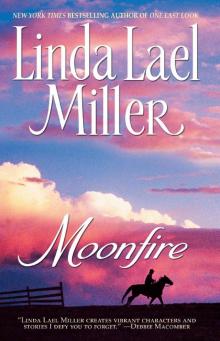 Moonfire
Moonfire The Yankee Widow
The Yankee Widow The Cowboy Way
The Cowboy Way Country Strong--A Novel
Country Strong--A Novel Forever and a Day
Forever and a Day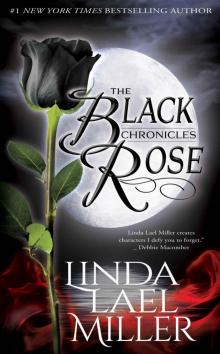 The Black Rose Chronicles
The Black Rose Chronicles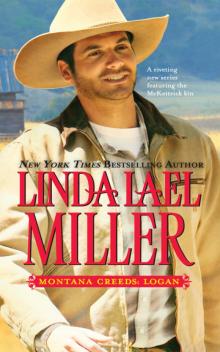 Montana Creeds: Logan
Montana Creeds: Logan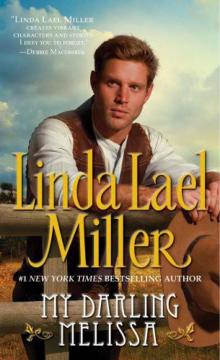 My Darling Melissa
My Darling Melissa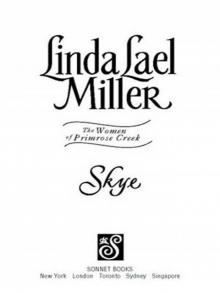 Skye
Skye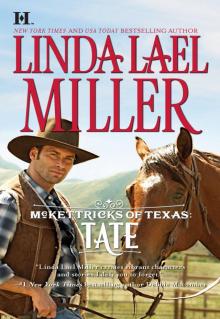 McKettricks of Texas: Tate
McKettricks of Texas: Tate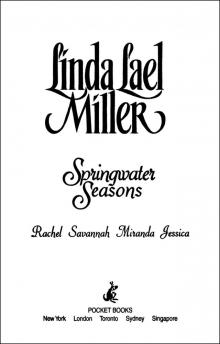 Springwater Seasons
Springwater Seasons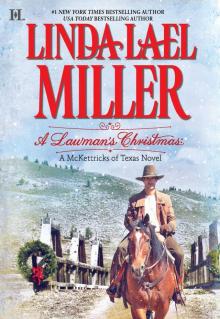 A Lawman's Christmas
A Lawman's Christmas Sierra's Homecoming
Sierra's Homecoming![Parable, Montana [4] Big Sky Summer Read online](http://i1.bookreadfree.com/i/03/22/parable_montana_4_big_sky_summer_preview.jpg) Parable, Montana [4] Big Sky Summer
Parable, Montana [4] Big Sky Summer One Last Weekend
One Last Weekend A Stone Creek Collection, Volume 2
A Stone Creek Collection, Volume 2 Tonight and Always
Tonight and Always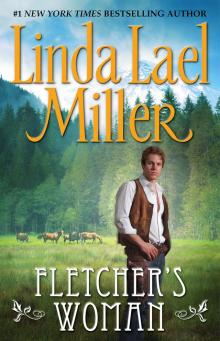 Fletcher's Woman
Fletcher's Woman A Snow Country Christmas
A Snow Country Christmas The Last Chance Cafe
The Last Chance Cafe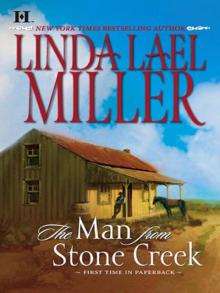 The Man from Stone Creek
The Man from Stone Creek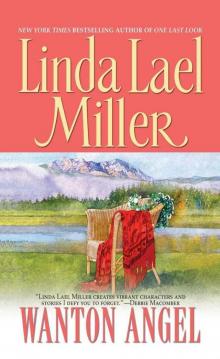 Wanton Angel
Wanton Angel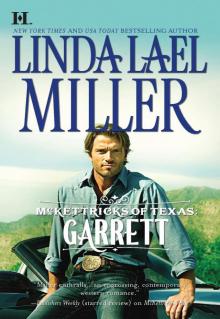 McKettricks of Texas: Garrett
McKettricks of Texas: Garrett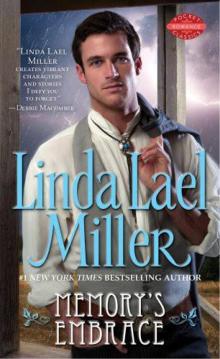 Memory's Embrace
Memory's Embrace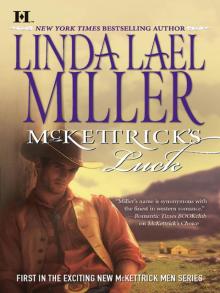 McKettrick's Luck
McKettrick's Luck Pirates
Pirates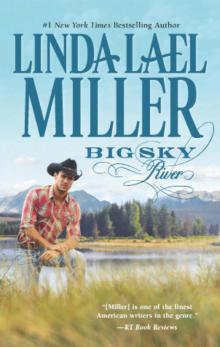 Big Sky River
Big Sky River Willow: A Novel (No Series)
Willow: A Novel (No Series) The McKettrick Legend: Sierra's HomecomingThe McKettrick Way (Hqn)
The McKettrick Legend: Sierra's HomecomingThe McKettrick Way (Hqn) Glory, Glory: Snowbound with the Bodyguard
Glory, Glory: Snowbound with the Bodyguard Two Brothers
Two Brothers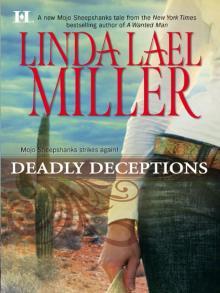 Deadly Deceptions
Deadly Deceptions Big Sky Secrets
Big Sky Secrets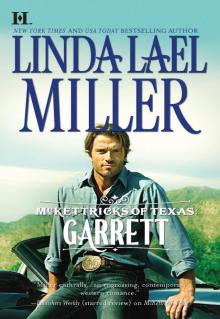 Garrett
Garrett A Creed in Stone Creek
A Creed in Stone Creek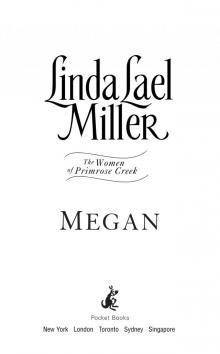 Megan
Megan McKettricks of Texas: Austin
McKettricks of Texas: Austin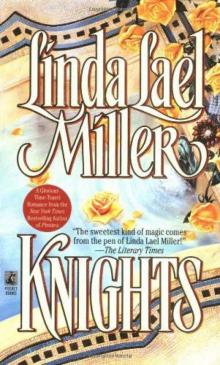 Knights
Knights High Country Bride
High Country Bride More Than Words Volume 4
More Than Words Volume 4 Glory, Glory
Glory, Glory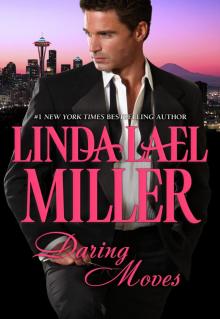 Daring Moves
Daring Moves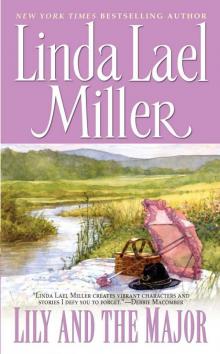 Lily and the Major
Lily and the Major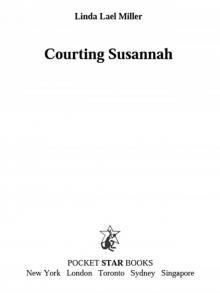 Courting Susannah
Courting Susannah Banner O'Brien
Banner O'Brien Big Sky Mountain
Big Sky Mountain Linda Lael Miller Bundle
Linda Lael Miller Bundle McKettrick's Pride
McKettrick's Pride A Stone Creek Collection Volume 1
A Stone Creek Collection Volume 1 A Wanted Man
A Wanted Man Big Sky Country
Big Sky Country The McKettrick Legend
The McKettrick Legend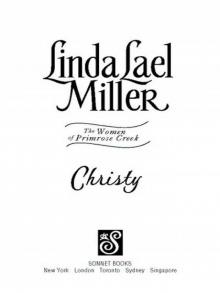 Christy
Christy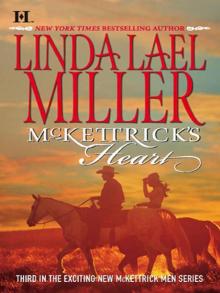 McKettrick's Heart
McKettrick's Heart Resurrection
Resurrection Arizona Heat
Arizona Heat Secondhand Bride
Secondhand Bride Snowflakes on the Sea
Snowflakes on the Sea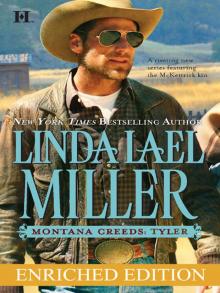 Montana Creeds: Tyler
Montana Creeds: Tyler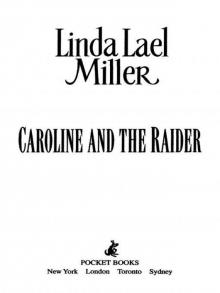 CAROLINE AND THE RAIDER
CAROLINE AND THE RAIDER A Proposal for Christmas: State SecretsThe Five Days of Christmas
A Proposal for Christmas: State SecretsThe Five Days of Christmas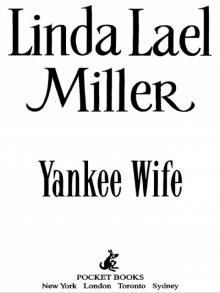 Yankee Wife
Yankee Wife Linda Lael Miller Montana Creeds Series Volume 1: Montana Creeds: LoganMontana Creeds: DylanMontana Creeds: Tyler
Linda Lael Miller Montana Creeds Series Volume 1: Montana Creeds: LoganMontana Creeds: DylanMontana Creeds: Tyler The Christmas Brides
The Christmas Brides McKettricks Bundle
McKettricks Bundle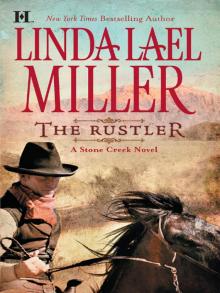 The Rustler
The Rustler Here and Then
Here and Then Only Forever
Only Forever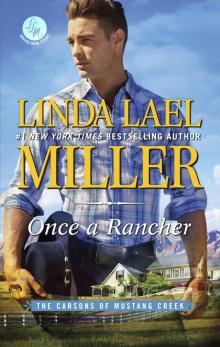 Once a Rancher
Once a Rancher The 24 Days of Christmas
The 24 Days of Christmas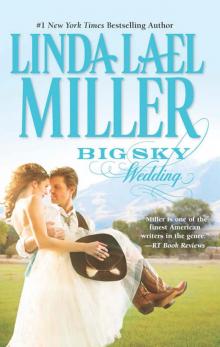 Big Sky Wedding
Big Sky Wedding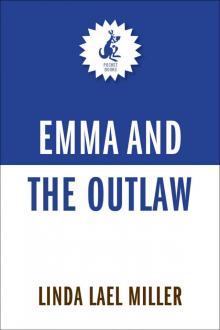 Emma and the Outlaw
Emma and the Outlaw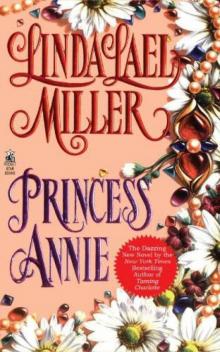 Princess Annie
Princess Annie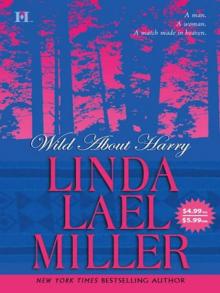 Wild About Harry
Wild About Harry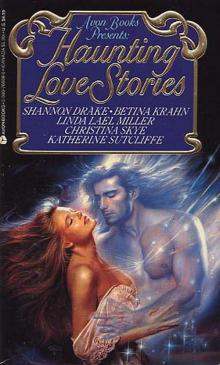 That Other Katherine
That Other Katherine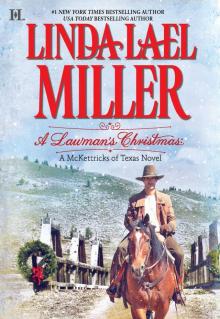 A Lawman's Christmas: A McKettricks of Texas Novel
A Lawman's Christmas: A McKettricks of Texas Novel Just Kate: His Only Wife (Bestselling Author Collection)
Just Kate: His Only Wife (Bestselling Author Collection)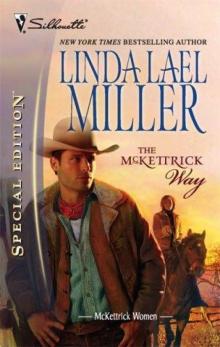 The McKettrick Way
The McKettrick Way Part of the Bargain
Part of the Bargain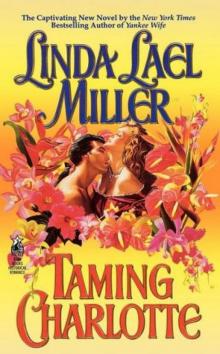 Taming Charlotte
Taming Charlotte Holiday in Stone Creek
Holiday in Stone Creek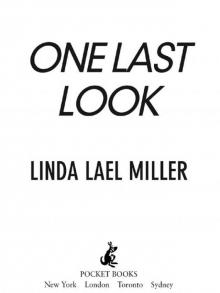 One Last Look
One Last Look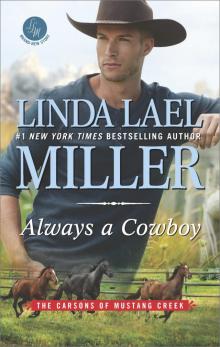 Always a Cowboy
Always a Cowboy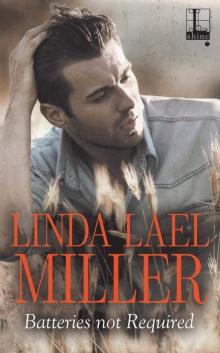 Batteries Not Required
Batteries Not Required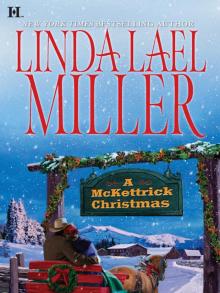 A McKettrick Christmas
A McKettrick Christmas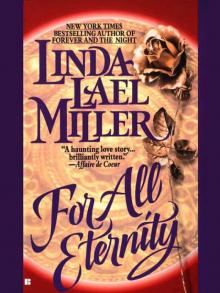 For All Eternity
For All Eternity The Marriage Season
The Marriage Season Corbin's Fancy
Corbin's Fancy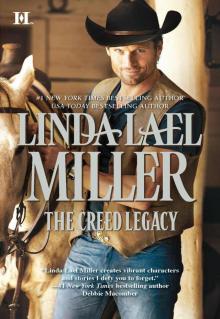 The Creed Legacy
The Creed Legacy Springwater Wedding
Springwater Wedding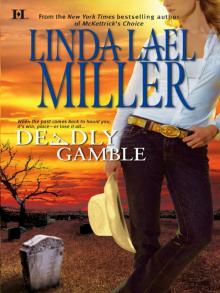 Deadly Gamble
Deadly Gamble Austin
Austin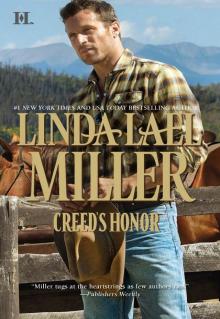 Creed's Honor
Creed's Honor A Creed Country Christmas
A Creed Country Christmas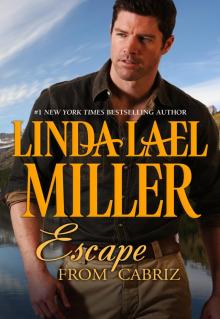 Escape from Cabriz
Escape from Cabriz There and Now
There and Now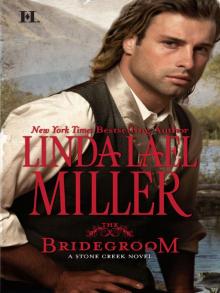 The Bridegroom
The Bridegroom State Secrets
State Secrets Bridget
Bridget